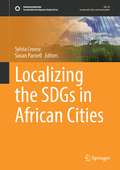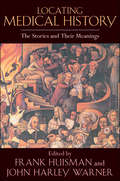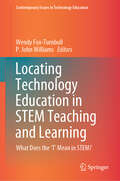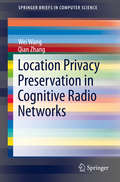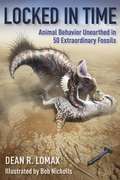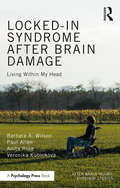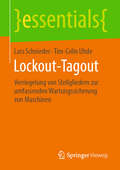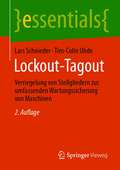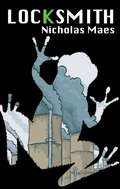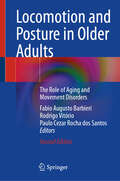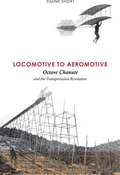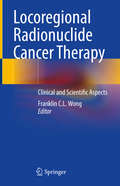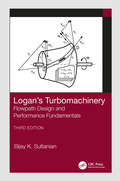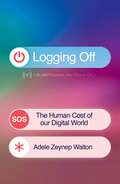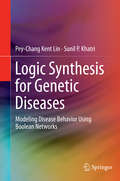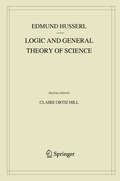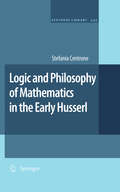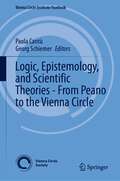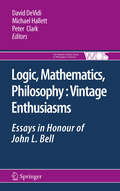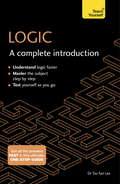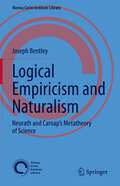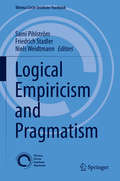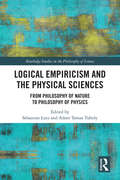- Table View
- List View
Localizing the SDGs in African Cities (Sustainable Development Goals Series)
by Susan Parnell Sylvia CroeseThis volume brings together a unique set of interventions from a variety of contributors to bridge the gap between research and policy with a distinct focus on Africa, drawing on work conducted as part of multiple interconnected research projects and networks on the Sustainable Development Goals (SDGs) and global policy implementation in African cities. Through the framework of the SDGs, and in particular Goal 11, the book aims to contribute to generating new knowledge about approaches to SDG localization that are grounded in complex and diverse local contexts, needs and realities, integrated perspectives and collaborative research. The volume draws together contributions from urban experts from different professional and disciplinary backgrounds, ranging from the fields of governance, planning, data, sustainability, health and finance, to provide critical insight into the current dynamics, actors, blind spots, constraints and also good practices and opportunities for realizing the SDGs in Africa. Readers will gain detailed and informed insight into the African experience of SDG localization, monitoring and implementation based on multiple case studies, and will learn of the practices needed to accelerate action towards achieving the SDGs in urban contexts. This book will be of interest to researchers and planners focusing on SDGs implementation in Africa, as well as government organizations, development practitioners and students committed to long-term, inclusive sustainable and participatory development.
Locating Medical History: The Stories and Their Meanings
by Frank Huisman and John Harley WarnerThe issues constituting the history of medicine are consequential: how societies organize health care, how individuals or states relate to sickness, how we understand our own identity and agency as sufferers or healers. In Locating Medical History: The Stories and Their Meanings, Frank Huisman, John Harley Warner, and other eminent historians explore and reflect on a field that accommodates a remarkable diversity of practitioners and approaches.At a time when medical history is facing profound choices about its future, these scholars explore the discipline in the distant and recent past in order to rethink its missions and methods today. They discuss such issues as the periodic estrangement of medical history from medicine, the influence of Foucault on the writing of medical history, and the shifts from social to cultural history and back again. Chapters explore the early history of the field, its transformations since the 1970s, and its prospects for the future.With diverse constituencies, a multiplicity of approaches, styles, and aims is both expected and desired. This volume locates medical history within itself and within larger historiographic trends, to provide a springboard for discussions about what the history of medicine should be, and what aims it should serve.Contributors: Olga Amsterdamska, University of Amsterdam; Warwick Anderson, University of Wisconsin, Madison; Allan M. Brandt, Harvard Medical School; Theodore M. Brown, University of Rochester; Roger Cooter, University College London; Martin Dinges, Institut für Geschichte der Medizin der Robert Bosch Stiftung; Alice Domurat Dreger, Michigan State University; Jacalyn Duffin, Queen's University; Elizabeth Fee, National Library of Medicine; Mary E. Fissell, The Johns Hopkins University; Danielle Gourevitch, École Pratique des Hautes Études; Anja Hiddinga, University of Amsterdam; Ludmilla Jordanova, University of East Anglia; Alfons Labisch, Heinrich-Heine-University; Hans-Uwe Lammel, University of Rostock; Sherwin B. Nuland, Yale University; Vivian Nutton, University College London; Roy Porter, formerly University College London; Susan M. Reverby. Wellesley College; David Rosner, Columbia University; Thomas Rütten, University of Newcastle upon Tyne; Heinz-Peter Schmiedebach, University of Greifswald; Christiane Sinding, Institut National de la Santé et de la Recherche Médicale
Locating Technology Education in STEM Teaching and Learning: What Does the ‘T’ Mean in STEM? (Contemporary Issues in Technology Education)
by P. John Williams Wendy Fox-TurnbullThis book offers clarity and consistency of thinking in relation to Technology Education when situated within a STEM approach to teaching. It examines the range of Innovations and Issues which are being considered by schools as they implement STEM, with particular focus on the place of Technology, or the ‘T’ in STEM. The book is divided into three sections: Philosophy, Implementation and Issues and Innovations, with each containing five to seven chapters. The first section lays the foundations for the remainder of the book: it focuses the readers on the technology aspect of STEM education and situates it to align with the international understanding of technology education. The second section provides insights into how STEM is best implemented to give technology due consideration across a range of disciplines with technology education, including engineering, food technology, and textile technology. This section also provides suggestions for the successful implementation of the STEM approach, and offers further insight through a range of case studies. The third section outlines and discusses a range of issues that pose a threat to the position and understanding of technology within the STEM teaching and learning approach. This section also examines how technology and STEM are situated within, are supported or are threatened by, other current innovations and approaches to teaching an integrated curriculum, such as the Maker Space Movement and Play-based Learning.
Location Privacy Preservation in Cognitive Radio Networks
by Wei Wang Qian ZhangThis brief focuses on the current research on location privacy preservation in cognitive radio networks (CRNs). Along with a review of the existing works, this book includes fundamental privacy models, possible frameworks, useful performance, and future research directions. It explores privacy preservation techniques, collaborative spectrum sensing, database-driven CRNS, and modeling potential privacy threats. Conflicts between database owners and unlicensed users can compromise location privacy, and CRNs are a means to mitigate the spectrum scarcity issue due to the increasing demand for wireless channel resources. By examining the current and potential privacy threats, the authors equip readers to understand this developing issue. The brief is designed for researchers and professionals working with computer communication networks and cognitive radio networks. Graduate students interested in networks and communication engineering will also find the brief helpful.
Locke, Science, and Politics
by Steven FordeIn this groundbreaking book, Steven Forde argues that John Locke's devotion to modern science deeply shaped his moral and political philosophy. Beginning with an account of the classical approach to natural and moral philosophy, and of the medieval scholasticism that took these forward into early modernity, Forde explores why the modern scientific project of Francis Bacon, Pierre Gassendi, Robert Boyle and others required the rejection of the classical approach. Locke fully subscribed to this rejection, and took it upon himself to provide a foundation for a compatible morality and politics. Forde shows that Locke's theory of moral 'mixed modes' owes much to Pufendorf, and is tailored to accommodate science. The theory requires a divine legislator, which in turn makes natural law the foundation of morality, rather than individual natural right. Forde shows the ways that Locke's approach modified his individualism, and colored his philosophy of property, politics and education.
Locked in Time: Animal Behavior Unearthed in 50 Extraordinary Fossils
by Dean R. Lomax Robert NichollsFossils allow us to picture the forms of life that inhabited the earth eons ago. But we long to know more: how did these animals actually behave? We are fascinated by the daily lives of our fellow creatures—how they reproduce and raise their young, how they hunt their prey or elude their predators, and more. What would it be like to see prehistoric animals as they lived and breathed?From dinosaurs fighting to their deaths to elephant-sized burrowing ground sloths, this book takes readers on a global journey deep into the earth’s past. Locked in Time showcases fifty of the most astonishing fossils ever found, brought together in five fascinating chapters that offer an unprecedented glimpse at the real-life behaviors of prehistoric animals. Dean R. Lomax examines the extraordinary direct evidence of fossils captured in the midst of everyday action, such as dinosaurs sitting on their eggs like birds, Jurassic flies preserved while mating, a T. rex infected by parasites. Each fossil, he reveals, tells a unique story about prehistoric life. Many recall behaviors typical of animals familiar to us today, evoking the chain of evolution that links all living things to their distant ancestors. Locked in Time allows us to see that fossils are not just inanimate objects: they can record the life stories of creatures as fully alive as any today. Striking and scientifically rigorous illustrations by renowned paleoartist Bob Nicholls bring these breathtaking moments to life.
Locked-in Syndrome after Brain Damage: Living within my head (After Brain Injury: Survivor Stories)
by Barbara Wilson Paul Allen Anita Rose Veronika KubickovaThe newest title in the series Survivor Stories, this book tells the story of Paul Allen, a photographer who likes opera and was a good baritone singer. At the age of 56 he sustained a stroke that left him paralysed and speechless. He has Locked-In Syndrome (LIS), a rare consequence of brain damage. Although Paul is fully conscious and his cognitive abilities are intact, he is unable to move or speak due to the paralysis of nearly all his voluntary muscles. However, Paul is keen to communicate and through his eye movements he tells his story, from his early life, career, singing and other interests, to the details of his stroke and the effects it has had on his life. The book also includes contributions from Paul’s wife Liz, who tells the story from her point of view, along with Paul’s physiotherapists, occupational therapists, speech therapists, psychologists and others from the Raphael Hospital who have assisted in Paul’s rehabilitation. In telling of his frustrations, his successes, his views on life and how he sees his future, Paul raises awareness of the quality of life possible for those with LIS. Combining scientific knowledge with personal narrative, this unique and optimistic book is of huge importance to any professional involved in the care of someone with a brain injury, and to the individuals and families touched by LIS.
Lockout-Tagout: Verriegelung Von Stellgliedern Zur Umfassenden Wartungssicherung Von Maschinen (essentials)
by Lars Schnieder Tim-Colin UhdeDas Inverkehrbringen und der Betrieb von Maschinen erfordern, das Einhalten von (Sicherheits-)Anforderungen zu dokumentieren, in Gefährdungsbeurteilungen das Risiko zu ermitteln, Schutzmaßnahmen abzuleiten und umzusetzen. Trotz des einheitlichen Rechtsrahmens kommt es gerade bei Instandhaltungsarbeiten weiterhin zu schweren Arbeitsunfällen, z.B. durch unkontrolliert austretende Energien wegen deaktivierter Schutzmechanismen. Die Autoren führen in den Rechtsrahmen der Maschinen- und Betriebssicherheit ein und leiten daraus die wichtige Absicherung unkontrollierter Energiequellen während der Instandhaltung ab. Mit Lockout-Tagout stellen sie ein anerkanntes Verfahren zur Verbesserung der Betriebssicherheit vor. Hierzu kombinieren die Autoren Verfahrensanweisungen, technische Maßnahmen und Schulungen mit einer kontinuierlichen Überwachung der Wirksamkeit der Maßnahmen.Die AutorenDr.-Ing. Lars Schnieder verantwortet in einer Software-Entwicklungsfirma das Geschäftsfeld Sicherheitsbegutachtung. Er ist international als Sachverständiger für die Maschinen- und Betriebssicherheit tätig.Tim-Colin Uhde ist in dieser Firma als Sachverständiger für die Maschinen- und Betriebssicherheit tätig.
Lockout-Tagout: Verriegelung von Stellgliedern zur umfassenden Wartungssicherung von Maschinen (essentials)
by Lars Schnieder Tim-Colin UhdeDas Inverkehrbringen und der Betrieb von Maschinen erfordern, das Einhalten von (Sicherheits-)Anforderungen zu dokumentieren, in Gefährdungsbeurteilungen das Risiko zu ermitteln, Schutzmaßnahmen abzuleiten und umzusetzen. Trotz des einheitlichen Rechtsrahmens kommt es gerade bei Instandhaltungsarbeiten weiterhin zu schweren Arbeitsunfällen, z.B. durch unkontrolliert austretende Energien wegen deaktivierter Schutzmechanismen. Die Autoren führen in den Rechtsrahmen der Maschinen- und Betriebssicherheit ein und leiten daraus die wichtige Absicherung unkontrollierter Energiequellen während der Instandhaltung ab. Mit Lockout-Tagout stellen sie ein anerkanntes Verfahren zur Verbesserung der Betriebssicherheit vor. In der 2. Auflage dieses Buches wurde die systematische Vorgehensweise zur Umsetzung eines Programms zur Gefährdungsbeherrschung von Betreibern von Maschinen grundlegend erweitert und ergänzt. Hierzu kombinieren die Autoren Verfahrensanweisungen, technische Maßnahmen und Schulungen mit einer kontinuierlichen Überwachung der Wirksamkeit der Maßnahmen.
Locksmith: A Felix Taylor Adventure
by Nicholas MaesCommended for the 2009 Best Books for Kids & Teens, long-listed for the 2009 CLA Book of the Year for Children Award Twelve-year-old Lewis Castorman is a master locksmith: there is no lock on earth that he is unable to open. He is therefore flattered when world-renowned chemist Ernst K. Grumpel invites him to his office in New York City and offers him a lock-picking assignment. His confidence quickly turns to dismay, however, when he learns this job will take him to Yellow Swamp in northern Alberta, the scene of a disastrous chemical spill a year earlier. He is also horrified to discover that Grumpel is utterly ruthless and, through his chemical inventions, can alter the rules of nature at his will. But the assignment is one that Lewis can’t refuse. How is Grumpel able to create such miraculous transformations? What secrets has he locked away and why has he taken pains to store them in Alberta? Despite the strange discoveries Lewis will make at every turn in his adventures, nothing will prepare him for the final encounter that awaits him in Yellow Swamp.
Locomotion and Posture in Older Adults: The Role of Aging and Movement Disorders
by Fabio Augusto Barbieri Rodrigo Vitório Paulo Cezar Rocha dos SantosThis book sheds new light on the effects of aging and movement disorders on movement control during walking and postural tasks. Understanding these dynamics is more important than ever as we face a future where the number of older adults is projected to double by 2050. The severity of this framework is exacerbated when aging is accompanied by movement disorders such as Parkinson's disease, Chorea, Multiple Sclerosis, Dystonia, and Huntington's disease. The book explores how complex interactions between musculoskeletal and neural systems are required for efficient execution of daily activities like walking and maintaining posture. The chapters in this comprehensive volume address the multifaceted challenges posed by aging and movement disorders in gait and postural control, including innovative rehabilitation strategies and the role of artificial intelligence. Expert contributors examine how environmental, sensorial, motor, cognitive, and individual factors influence locomotor and postural activities. Readers will discover cutting-edge research findings that address critical questions about planning, performance, and impairment in these essential functions. This book is a must-read for anyone seeking to understand and reduce the effects of aging and movement disorders on gait and posture. This book is an invaluable resource for clinicians, physical therapists, occupational therapists, psychologists, biologists, researchers, health professionals, as well as those involved in physical education and sports medicine. It highlights the mechanisms involved in controlling and planning postural and gait tasks in both neurologically healthy older individuals and those who suffer from movement disorders, offering new perspectives on interventions and technologies designed to improve understanding or delay impairments due to aging or movement disorders on gait and posture. Whether you're a practitioner or researcher in related fields, this book equips you with the essential knowledge to enhance the quality of life for older adults facing these challenges.
Locomotive to Aeromotive: Octave Chanute and the Transportation Revolution
by Tom Crouch Simine ShortFrench-born and self-trained civil engineer Octave Chanute designed America's two largest stockyards, created innovative and influential structures such as the Kansas City Bridge over the previously "unbridgeable" Missouri River, and was a passionate aviation pioneer whose collaborative approach to aeronautical engineering problems helped the Wright brothers take flight. Drawing on a rich trove of archival material and exclusive family sources, Locomotive to Aeromotive is the first detailed examination of Chanute's life and his immeasurable contributions to the fields of engineering and transportation, from the ground transportation revolution of the mid-nineteenth century to the early days of aviation. Aviation researcher and historian Simine Short brings to light in colorful detail many previously overlooked facets of Chanute's life, in both his professional accomplishments and his personal relationships. Through the reflections of other engineers, scientists and pioneers in various fields who knew him, Short characterizes Chanute as a man who believed in fostering and supporting people who were willing to learn. This well-researched biography cements Chanute's place as a preeminent engineer, pioneer, and mentor in the history of transportation in the United States and the development of the airplane.
Locoregional Radionuclide Cancer Therapy: Clinical and Scientific Aspects
by Franklin C. L. WongThis book reviews locoregional radionuclide cancer therapies (LRCT). Proving an increasingly viable alternative to radiotherapy, radionuclide therapy includes a diversity of choices of well characterized biochemical and physiologic target molecules. The delivery and retention of radionuclides may be monitored by advanced imaging for exact tissue localization and for real-time dosimetry to enable personalized precision medicine. Radiopharmaceuticals in human cancer therapies are typically delivered in systemic routes but can also be designed for locoregional routes to harness pharmacokinetic advantages of higher payload and lower systemic toxicities. This book explores the latest advancements and clinical considerations of the locoregional approach.Throughout the chapters, the clinical and scientific bases of cancer treatment and the locoregional use of radionculides are explored. Mathematical models of radiation dosimetry of locoregional radionculdies on tissues are studied using common models for multiple commercially available radionuclides. Rodent and canine tumor models of LRCT are compared for selected radionuclides and radiopharmaceuticals. The practical aspects of radiopharmaceuticals production, marketing, transport, as well as radiation protection are reviewed. Finally, the combination of LRCT with immunotherapy and other cancer therapies and prospective future use of LRCT are discussed.This is a guide for practicing nuclear physicians, interventional radiologists, radiation oncologists, radiation scientists, veterinarians and oncologists to expand their knowledge base and to prepare for designing locoregional radionuclide cancer therapies in animals and in humans.
Logan's Turbomachinery: Flowpath Design and Performance Fundamentals, Third Edition (Mechanical Engineering)
by Bijay SultanianLogan's Turbomachinery: Flowpath Design and Performance Fundamentals, Third Edition is the long-awaited revision of this classic textbook, thoroughly updated by Dr. Bijay Sultanian. While the basic concepts remain constant, turbomachinery design has advanced since the Second Edition was published in 1993. Airfoils in modern turbomachines feature three-dimensional geometries, Computational Fluid Mechanics (CFD) has become a standard design tool, and major advances have been made in the materials and manufacturing technologies that affect turbomachinery design. The new edition adresses these trends to best serve today's students, and design engineers working in turbomachinery industries.
Logging Off: The Human Cost of Our Digital World
by Adele Zeynep Walton'You won't look at your screens in the same way after reading this book' Grace Blakeley, author of VULTURE CAPITALISM 'Logging Off is a life-saving book' Mikaela Loach, author of IT'S NOT THAT RADICAL'A harrowing but important read' Carole CadwalladrWe live in a digital world. In the 30 years since we've been online, we've created connections, crossed boundaries and discovered new worlds. We have done things generations before us could never have imagined. But at what cost?Growing up as a Gen Z, Adele spent endless hours as a teenager on social media, shaping her view of herself and the world. As a freelance journalist, she has used her social media platforms and digital technology to develop a career in an unfamiliar and competitive industry, benefitting from the opportunities that these spaces can offer. But after losing her sister to online harms, she realised that our current digital world is failing us.We are an anxious and discontent generation. Our lived realities and our online vulnerabilities are inextricably linked, and this means big business for social media tycoons who want us to stay scrolling at any cost. As Big Tech barons make their billions, capitalising on our emotions, instincts, insecurities and desires, everyday people are losing out.From workers being fired by algorithms, to online forums dedicated to revenge porn and encouraging suicide, to censorship of marginalised voices and the turbulent impacts of AI, Logging Off reveals that our digital world is currently fuelling crises that only empathy, agency and humanity can resolve. This book is a call for a radical reclamation of our digital world, for a more humane future that empowers us all.'Poignant, timely and astute, Logging Off is a compelling examination of how our lives have been shaped - and irrevocably changed - by the rise of digital technologies' Yomi Adegoke, author of THE LIST
Logging Off: The Human Cost of Our Digital World
by Adele Zeynep Walton'You won't look at your screens in the same way after reading this book' Grace Blakeley, author of VULTURE CAPITALISM 'Logging Off is a life-saving book' Mikaela Loach, author of IT'S NOT THAT RADICAL'A harrowing but important read' Carole CadwalladrWe live in a digital world. In the 30 years since we've been online, we've created connections, crossed boundaries and discovered new worlds. We have done things generations before us could never have imagined. But at what cost?Growing up as a Gen Z, Adele spent endless hours as a teenager on social media, shaping her view of herself and the world. As a freelance journalist, she has used her social media platforms and digital technology to develop a career in an unfamiliar and competitive industry, benefitting from the opportunities that these spaces can offer. But after losing her sister to online harms, she realised that our current digital world is failing us.We are an anxious and discontent generation. Our lived realities and our online vulnerabilities are inextricably linked, and this means big business for social media tycoons who want us to stay scrolling at any cost. As Big Tech barons make their billions, capitalising on our emotions, instincts, insecurities and desires, everyday people are losing out.From workers being fired by algorithms, to online forums dedicated to revenge porn and encouraging suicide, to censorship of marginalised voices and the turbulent impacts of AI, Logging Off reveals that our digital world is currently fuelling crises that only empathy, agency and humanity can resolve. This book is a call for a radical reclamation of our digital world, for a more humane future that empowers us all.'Poignant, timely and astute, Logging Off is a compelling examination of how our lives have been shaped - and irrevocably changed - by the rise of digital technologies' Yomi Adegoke, author of THE LIST
Logic Synthesis for Genetic Diseases
by Pey-Chang Kent Lin Sunil P. KhatriThis book brings to bear a body of logic synthesis techniques, in order to contribute to the analysis and control of Boolean Networks (BN) for modeling genetic diseases such as cancer. The authors provide several VLSI logic techniques to model the genetic disease behavior as a BN, with powerful implicit enumeration techniques. Coverage also includes techniques from VLSI testing to control a faulty BN, transforming its behavior to a healthy BN, potentially aiding in efforts to find the best candidates for treatment of genetic diseases.
Logic and General Theory of Science (Husserliana: Edmund Husserl – Collected Works #15)
by Edmund HusserlThe stated subject of these lecture courses given by Husserlbetween 1910 and 1918is ‘reason, the word for the mental activities and accomplishments that govern knowledge, give it form and supply it with norms.’They show their author still pursuing the course set out in the Logical Investigations up to the end of the second decade of the century and displaying utter consistency with stands that he began taking on meaning, analyticity, Platonism, manifolds, mathematics, psychologism, etc. in the 1890s. Thus, they undermine many idées reçues about the development of his thought. The centerpiece of this work is an exploration of the realm of meaning.Moreover, they add new dimensions to standard discussions by taking readers back to the place where phenomenology and analytic philosophy diverged. They show that Husserl tangled long and hard with the very ideas that went into the making of the latter and offer a wealth of interesting insights into sense and meaning, theory of judgment, complete and incomplete meanings, states of affairs, extensional logic, the relationship between logic and mathematics, functions and arguments, propositional functions, quantification, existential generalization, the word ‘all,’ number theory, sets, modality, deductive theory, ideas that are still under discussion today.Prepared for oral delivery in the classroom, they are refreshingly lively and spontaneous. They are clearer, more explicit, and readable than the books Husserl published during his lifetime.
Logic and Philosophy of Mathematics in the Early Husserl
by Stefania CentroneLogic and Philosophy of Mathematics in the Early Husserl focuses on the first ten years of Edmund Husserl's work, from the publication of his Philosophy of Arithmetic (1891) to that of his Logical Investigations (1900/01), and aims to precisely locate his early work in the fields of logic, philosophy of logic and philosophy of mathematics. Unlike most phenomenologists, the author refrains from reading Husserl's early work as a more or less immature sketch of claims consolidated only in his later phenomenology, and unlike the majority of historians of logic she emphasizes the systematic strength and the originality of Husserl's logico-mathematical work. The book attempts to reconstruct the discussion between Husserl and those philosophers and mathematicians who contributed to new developments in logic, such as Leibniz, Bolzano, the logical algebraists (especially Boole and Schröder), Frege, and Hilbert and his school. It presents both a comprehensive critical examination of some of the major works produced by Husserl and his antagonists in the last decade of the 19th century and a formal reconstruction of many texts from Husserl's Nachlaß that have not yet been the object of systematical scrutiny. This volume will be of particular interest to researchers working in the history, and in the philosophy, of logic and mathematics, and more generally, to analytical philosophers and phenomenologists with a background in standard logic.
Logic, Epistemology, and Scientific Theories - From Peano to the Vienna Circle (Vienna Circle Institute Yearbook #29)
by Georg Schiemer Paola CantùThis book provides a collection of chapters on the development of scientific philosophy and symbolic logic in the early twentieth century. The turn of the last century was a key transitional period for the development of symbolic logic and scientific philosophy. The Peano school, the editorial board of the Revue de Métaphysique et de Morale, and the members of the Vienna Circle are generally mentioned as champions of this transformation of the role of logic in mathematics and in the sciences. The scholarship contained provides a rich historical and philosophical understanding of these groups and research areas. Specifically, the contributions focus on a detailed investigation of the relation between structuralism and modern mathematics. In addition, this book provides a closer understanding of the relation between symbolic logic and previous traditions such as syllogistics. This volume also informs the reader on the relation between logic, the history and didactics in the Peano School. This edition appeals to students and researchers working in the history of philosophy and of logic, philosophy of science, as well as to researchers on the Vienna Circle and the Peano School.
Logic, Mathematics, Philosophy, Vintage Enthusiasms
by Peter Clark David Devidi Michael HallettThe volume includes twenty-five research papers presented as gifts to John L. Bell to celebrate his 60th birthday by colleagues, former students, friends and admirers. Like Bell's own work, the contributions cross boundaries into several inter-related fields. The contributions are new work by highly respected figures, several of whom are among the key figures in their fields. Some examples: in foundations of maths and logic (William Lawvere, Peter Aczel, Graham Priest, Giovanni Sambin); analytical philosophy (Michael Dummett, William Demopoulos), philosophy of science (Michael Redhead, Frank Arntzenius), philosophy of mathematics (Michael Hallett, John Mayberry, Daniel Isaacson) and decision theory and foundations of economics (Ken Bimore). Most articles are contributions to current philosophical debates, but contributions also include some new mathematical results, important historical surveys, and a translation by Wilfrid Hodges of a key work of arabic logic.
Logic: A Complete Introduction: Teach Yourself
by Siu-Fan LeeUnderstand Logic is a comprehensive introduction to this fascinating though sometimes challenging subject. As well as looking at logic in theoretical terms the book considers its everyday uses and demonstrates how it has genuine practical applications. It will take you step by step through the most difficult concepts and is packed with exercises to help you consolidate your learning at every stage. Covering everything from syllogistic logic to logical paradoxes and even looking at logic in Alice in Wonderland, this is the only guide you will ever need.
Logical Empiricism and Naturalism: Neurath and Carnap’s Metatheory of Science (Vienna Circle Institute Library)
by Joseph BentleyThis text provides an extensive exploration of the relationship between the thought of Otto Neurath and Rudolf Carnap, providing a new argument for the complementarity of their mature philosophies as part of a collaborative metatheory of science. In arguing that both Neurath and Carnap must be interpreted as proponents of epistemological naturalism, and that their naturalisms rest on shared philosophical ground, it is also demonstrated that the boundaries and possibilities for epistemological naturalism are not as restrictive as Quinean orthodoxy has previously suggested. Both building on and challenging the scholarship of the past four decades, this naturalist reading of Carnap also provides a new interpretation of Carnap’s conception of analyticity, allowing for a refutation of the Quinean argument for the incompatibility of naturalism and the analytic/synthetic distinction. In doing so, the relevance and potential importance of their scientific meta-theory for contemporary questions in the philosophy of science is demonstrated.This text appeals to students and researchers working on Logical Empiricism, Quine, the history of analytic philosophy and the history of philosophy of science, as well as proponents of naturalized epistemology.
Logical Empiricism and Pragmatism
by Friedrich Stadler Sami Pihlström Niels WeidtmannThis book explores the complexity of two philosophical traditions, extending from their origins to the current developments in neopragmatism. Chapters deal with the first encounters of these traditions and beyond, looking at metaphysics and the Vienna circle as well as semantics and the principle of tolerance. There is a general consensus that North-American (neo-)pragmatism and European Logical Empiricism were converging philosophical traditions, especially after the forced migration of the European Philosophers. But readers will discover a pluralist image of this relation and interaction with an obvious family resemblance. This work clarifies and specifies the common features and differences of these currents since the beginning of their mutual scientific communication in the 19th century. The book draws on collaboration between authors and philosophers from Vienna, T#65533;bingen, and Helsinki, and their networks. It will appeal to philosophers, scholars in the history of philosophy, philosophers of science, pragmatists and beyond.
Logical Empiricism and the Physical Sciences: From Philosophy of Nature to Philosophy of Physics (Routledge Studies in the Philosophy of Science)
by Sebastian Lutz; Adam Tamas TubolyThis volume has two primary aims: to trace the traditions and changes in methods, concepts, and ideas that brought forth the logical empiricists’ philosophy of physics and to present and analyze the logical empiricists’ various and occasionally contrary ideas about the physical sciences and their philosophical relevance. These original chapters discuss these developments in their original contexts and social and institutional environments, thus showing the various fruitful conceptions and philosophies behind the history of 20th-century philosophy of science. Logical Empiricism and the Natural Sciences is divided into three thematic sections. Part I surveys the influences on logical empiricism’s philosophy of science and physics. It features chapters on Maxwell’s role in the worldview of logical empiricism, on Reichenbach’s account of objectivity, on the impact of Poincaré on Neurath’s early views on scientific method, Frank’s exchanges with Einstein about philosophy of physics, and on the forgotten role of Kurt Grelling. Part II focuses on specific physical theories, including Carnap’s and Reichenbach’s positions on Einstein’s theory of general relativity, Reichenbach’s critique of unified field theory, and the logical empiricists’ reactions to quantum mechanics. The third and final group of chapters widens the scope to philosophy of science and physics in general. It includes contributions on von Mises’ frequentism; Frank’s account of concept formation and confirmation; and the interrelations between Nagel’s, Feigl’s, and Hempel’s versions of logical empiricism. This book offers a comprehensive account of the logical empiricists’ philosophy of physics. It is a valuable resource for researchers interested in the history and philosophy of science, philosophy of physics, and the history of analytic philosophy.
